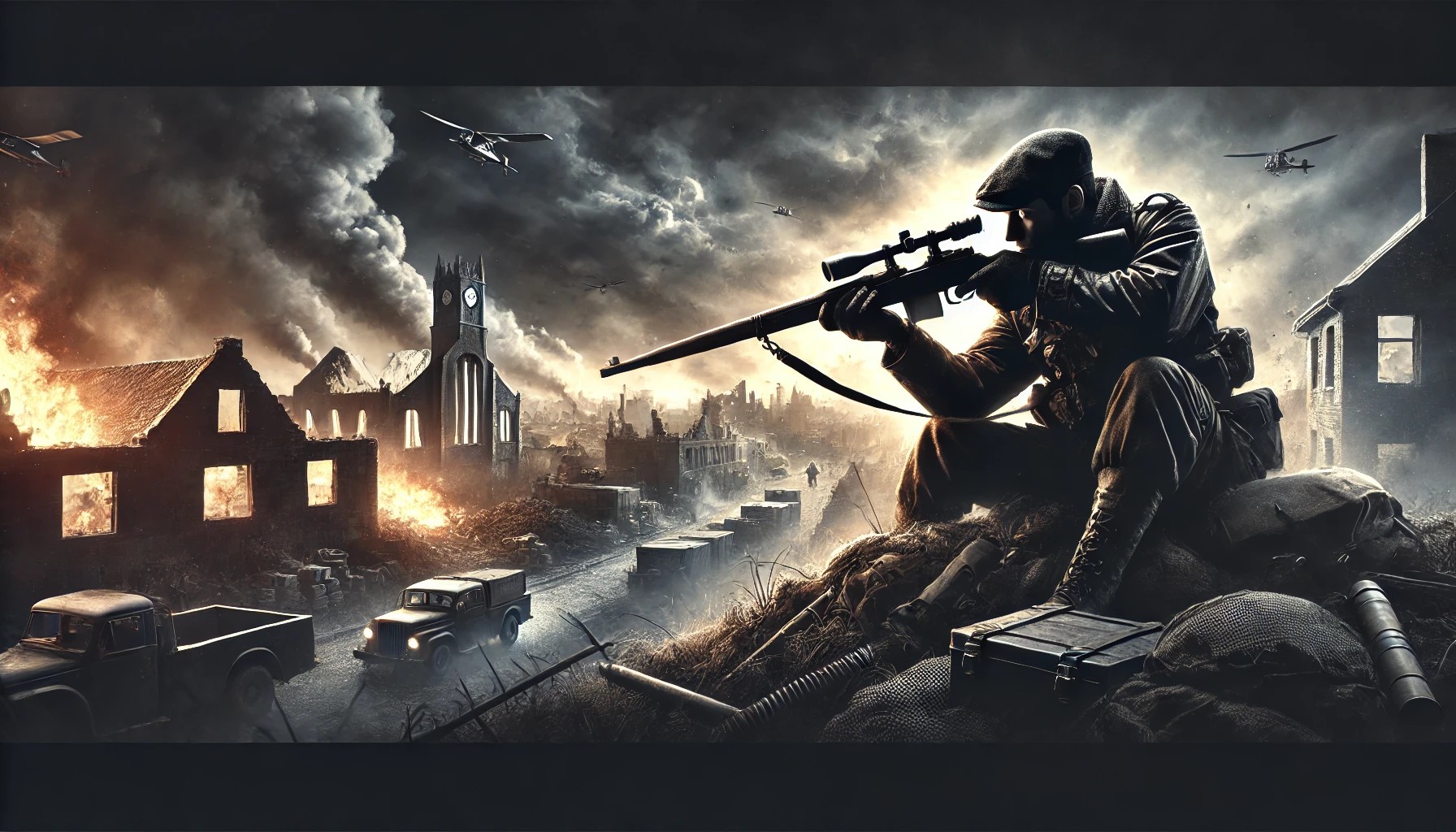Sniper Elite: Resistance is the latest chapter in a franchise known for its emphasis on stealthy marksmanship, detailed historical settings, and a wealth of tactical options. The series has gained significant popularity for its immersive storylines that revolve around clandestine operations and the lethal efficiency of long-range combat. Voice acting has always played a part in drawing players into the gritty realities of wartime, ensuring that each character feels grounded, distinct, and memorable. Recent information has drawn attention to the cast of Sniper Elite: Resistance, particularly the voice behind Harry Hawker, a character who resonates deeply within this stealth-focused world. According to Insider Gaming, Dot Esports, and NewsBreak, the voice actors in Sniper Elite: Resistance contribute heavily to the tension and atmosphere that players experience on each mission.
The Evolution of Sniper Elite: Resistance
Before delving into the cast and, especially, the identity of Harry Hawker’s voice actor, it is helpful to contextualize the significance of Sniper Elite: Resistance within the broader Sniper Elite franchise. Historically, these games revolve around clandestine operations set against war-torn backdrops, allowing players to step into the boots of skilled marksmen who undertake high-risk missions. Titles in the series typically focus on infiltration, sabotage, and carefully orchestrated eliminations of key figures. The hallmark of these games lies in their realism, such as ballistic models simulating bullet drop and wind interference, slow-motion X-ray kill cams that underscore the grim realities of warfare, and the need to blend into surroundings to avoid detection.
Resistance, as an entry, aims to refine this well-established template by offering new locales, updated mechanics, and a cast that includes both fresh faces and returning players. The creative team behind the game has underscored how narrative would be more central than ever, with new characters populating the war-torn environment. The narrative context emphasizes a mission in which Allied operatives or their sympathizers must coordinate a resistance movement behind enemy lines. Enemies may vary from heavily armed squads to specialized counter-sniper units, all working together to suppress uprisings. The protagonist, accompanied by a network of allies, navigates moral and strategic challenges that shape the outcome of each operation.
In this high-stakes environment, the presence of realistic, well-delivered voice acting can draw players further into the drama. Each conversation in a safe house, each whispered directive over the radio, and each urgent call for backup becomes a crucial piece of the puzzle that immerses players in the complexities and perils of occupying or liberating territory under dire circumstances.
The Role of Voice Acting in Realistic Warfare
Voices in warfare-based games can either elevate the storytelling or undershoot the tone, breaking immersion. Developers of historical or pseudo-historical shooters must find actors capable of delivering lines that reflect the tension, fear, and courage of battle. The Sniper Elite series, known for its subtle blend of authenticity and action, leans heavily on voice performances. From the commanding tone of officers delivering mission briefings to the subdued conversations among local resistance members, everything contributes to painting a consistent portrayal of conflict.
In Sniper Elite: Resistance, the significance of voice acting is heightened by an emphasis on building alliances with local fighters and forging relationships that define success or failure in shadowy missions. The voice actors must portray nuance that acknowledges the moral dilemmas lurking behind every shot fired. Characters might need to wrestle with guilt over taking lives, or weigh the cost of saving a valuable target at the potential expense of civilians. The audio performances are thus essential to bridging players’ emotional involvement with these scenarios.
Harry Hawker: The Voice and Character
Within this tapestry of covert missions and alliances, Harry Hawker emerges as a critical piece of the narrative puzzle. Insider Gaming describes him as a central figure whose personal background reveals hidden motivations that fuel his involvement in the resistance. The impetus behind his transformation from an ordinary citizen (or possibly a soldier displaced from his original unit) into a capable warrior often stems from personal loss or an intense desire to liberate territory from oppression. Dot Esports also notes that early glimpses of the storyline portray Hawker wrestling with moral choices, sometimes defying direct orders for the greater good.
The identity of Harry Hawker’s voice actor has generated curiosity among fans, especially those engaged with the Sniper Elite series from earlier installments. Many players appreciate the nuance that voice actors bring, particularly if the character’s lines revolve around moral quandaries and shifting loyalties. According to multiple sources, including NewsBreak, the voice behind Harry Hawker belongs to a performer who has background experience in dramatic roles, imbuing the character with both emotional depth and a scrappy resolve. While official confirmations or detailed interviews might still be forthcoming, many who have glimpsed early snippets of gameplay remark that Hawker’s voice commands attention as a major presence.
His accent, cadence, and tone all feed into the impression that he is not a polished soldier but rather a driven, resourceful individual thrust into a war he never asked for. This approach aligns with the series’ tradition of humanizing characters, painting them as more than mere action heroes. Instead, Hawker’s lines convey the burdens of preserving life, the fear that creeps in while lying prone behind a sniper scope, and the fleeting moments of banter that lighten tense scenarios.
Additional Noteworthy Performances in Sniper Elite: Resistance
The casting for Sniper Elite: Resistance extends well beyond Harry Hawker, featuring a roster of skilled voice actors and actresses tasked with bringing life to both the Allied resistance and opposing forces. According to information compiled by Dot Esports, certain names in the cast may ring familiar to fans of earlier Sniper Elite titles, suggesting that some continuity in voice acting persists from prior games. Meanwhile, new additions reflect the expanded scope of the storyline, which features a broader array of personalities.
Allied operatives, for instance, might include voices representing British intelligence officers, French or Belgian underground contacts, and even individuals from neutral regions spurred into action by oppressive forces. Each of these roles demands subtlety, capturing the region-specific dialects, emotional struggles, and sense of urgency that pervade an intense, near-hopeless environment. The antagonistic side, from high-ranking enemy officers to specialized counter-sniper teams, also contributes their own menacing or authoritarian vocal performances.
In line with the franchise’s tradition, those playing minor characters—such as radio operators or local civilians—aim to replicate historically accurate accents or produce regionally influenced dialogue. These smaller parts build on the authenticity that Sniper Elite’s gameplay fosters, particularly in missions that revolve around infiltration of occupied towns or sabotage within enemy bases. Together, these voices paint an acoustic landscape where each level resonates with the tension of hidden agendas and personal stakes.
Why Voice Acting Matters for the Sniper Elite Franchise
The importance of voice acting in Sniper Elite: Resistance, or any Sniper Elite game, cannot be understated. The series revolves around the concept of a lone marksman or a small team venturing deep behind enemy lines, separated from conventional army support. The narrative must rely on personal interactions—briefings, whispered conversations, confessions, or emotional exchanges—to highlight the moral weight behind each assignment. If these lines are delivered without conviction or clarity, the illusions might shatter, reducing the experience to a mere shooting gallery.
Voice actors can also breathe life into the factional tensions often depicted in the series. Historical contexts such as the Second World War or other conflicts serve as the backdrop for relationships forged under duress. A voice brimming with fear, for example, can underscore how little stands between an underground operative and discovery by enemy patrols. Similarly, a reassuring voice of leadership might rally a group to push forward, exposing themselves to sniper fire for a crucial objective. In these ways, voice performances function as a narrative glue, ensuring that the game’s stealth mechanics and ballistic systems do not overshadow the human dimension of war.
Potential Future for Sniper Elite: Resistance
Enthusiasts who track the franchise’s progress speculate that Sniper Elite: Resistance may be part of a broader plan to push the series’ boundaries, whether through expansions, spin-offs, or collaborative online experiences. If the title gains traction, players might expect additional downloadable content that enriches the story arc for characters like Harry Hawker, unveiling backstories or side missions that place them in moral quandaries. This approach would reinforce the idea that voice acting goes beyond a static script; it can expand with new lines, branching narratives, and cameo appearances from established series icons.
The team behind Sniper Elite typically extends each entry’s life with post-launch updates that introduce fresh missions or sniper challenges in different geographical settings. A future update could highlight how Hawker evolves as a leader in the resistance, possibly forging alliances with NPCs voiced by recognized talents in the voice-acting sphere. The synergy between voice performances and gameplay expansions keeps players invested, merging intense bullet physics with evolving personal journeys.
Much of the appeal of the Sniper Elite brand stems from its capacity to blend slow, methodical tension with sudden bursts of combat, all while upholding the sense that every bullet can change the course of a conflict. Characters like Harry Hawker embody the emotional stakes behind that tension, letting players connect on a deeper level than merely pulling the trigger. As Sniper Elite: Resistance moves forward and reveals more about its narrative, fans anticipate further insights about the entire cast’s creative process.
Those already engaged with the franchise, or discovering it for the first time, can rest assured that voice acting remains a top priority. The investment in strong vocal performances, especially from individuals who relish the historical or thematic complexities of each role, ensures that each mission resonates beyond mere action. Whether players find themselves following Hawker through narrow alleyways under looming searchlights, or they witness him confront an adversary who threatens the entire resistance cell, the soundscape will deliver the emotional punch that unites all of Sniper Elite’s core themes.
With that in mind, the voice actors for Sniper Elite: Resistance—spearheaded by the performer behind Harry Hawker—stand poised to elevate the game’s gritty realism. Each line, each audible moment of hesitation or resolve, will immerse players in a struggle that transcends the scope of a typical first-person or third-person action experience. The synergy of advanced ballistics and compelling storytelling, as shaped by these voices, ensures that the battles raging in war-torn villages carry more than gunfire and echoes: they carry the human dimension of a mission that could tip the balance of an entire resistance effort.

